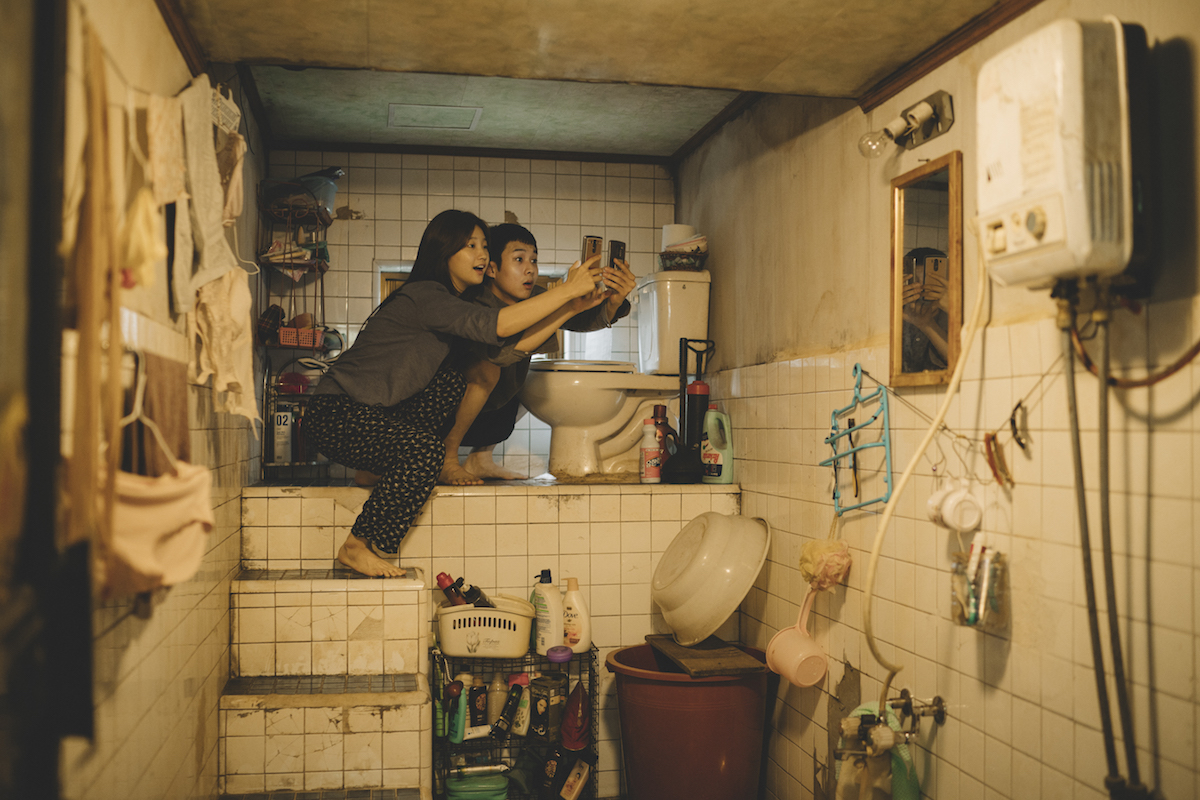Everything you’ve heard about the Cannes-celebrated Parasite, or perhaps more pointedly, Scenes from the Class Struggle in Seoul, is tenfold true. A savage, toothy satire about social class, or more specifically, about the resourcefulness and eventual uprising of the underclass, it’s a picture that could easily find a not-so-strange bedfellow in this year’s Hustlers, a similar tale of smart, scrappy opportunists ill content to stay in their respective lanes, particularly when a big, brass ring is in sight.
And in Parasite, what a ring it is. The fifth feature by daring Korean filmmaker Bong Joon-Ho (The Host, Snowpiercer, Mother), is both his most narratively substantive and directorially accomplished, revealing a deft balance of comedy and tragedy, inextricably linked in the hardscrabble lives of an anti-heroic, skid-row family that insinuates itself into the lives of Seoul’s one percenters with comic, then disastrous results.
The less you know about Parasite going in the better; even the film’s trailers hint at its
metamorphosing machinations. So to be fully surprised—and you will be—it’s best to be in the dark. It’s also why one can only judiciously share details of the film’s set-up and first half and few from its second, where this knockout social and cultural assassination finds its bullseyes.
Picture opens partially below the street level of Seoul’s depths, the down-on-their-luck Kim family residing in a cramped basement hovel (not unlike the meager abode of a similar clan in last year’s Japanese gem Shoplifters), at most certainly at the city’s lowest elevation.
Father Ki-taek (Kang-ho Song) and mother Chung-sook (Hye-jin Jang) live with young-adult children, son Ki-woo (Woo-sik Choi) and daughter Ki-jung (So-dam Park), the group eking out a living folding cardboard take-out boxes for the pizzeria upstairs while comically stepping over each other to hook onto neighbors’ unreliable wi-fi.
Things start to look up when a former high school friend (Seo-joon Park) drops by with news and a proposition. Headed off to university and unable to fulfill his gig as a private English tutor to a wealthy family, he insists that Ki-woo, who also happens to be an excellent English speaker, fill his spot.
Ki-woo’s entre into the fabulously wealthy Park family household—the structure a marvel of slick, upscale modernity, the family one of endless deep pockets—proves an easy one, his job tutoring teen daughter Da-hye (Jung Ji-so) of little demand.
But what about the family’s eccentric young son, Da-song (Jung Hyun-joon), in need of an art teacher (and probably a bit of counseling)? On Ki-Woo’s false recommendation comes a purported former acquaintance—sister Ki-jung, posing as highly-pedigreed art tutor, one who also dabbles in psychology (learned from Google searches) for a steep price. Like her brother, Ki-jung quickly works her way into the family’s good graces and pocketbook.
The situation comically escalates when parents Ki-taek and Chung-sook replace the trusted family chauffer and longtime housekeeper, the Kim family having fully infiltrated the wealthy enclave, all below the radar and without letting on their true identities, gaining the trust of the Park parents, a glamorous, clueless mother (Cho Yeo-jeong) and tech industry alpha-dad (Sun Kyun-Lee).
This is all good fun. In spite of the Kim family’s blatant mistruths and manipulations (including those that destroy the livelihoods of former household employees), you can’t help but root for them to achieve a reversal of fortune (the point is only to lift themselves out of poverty, not perpetuate malice). There’s great delight seeing them take over the household – teaching, cooking, cleaning, driving, shaping the children, and all on the downlow.
This comically ripe set-up frames the picture’s first half, culminating in a drunken evening where the family takes rule of the house after its owners leave on a weekend camping trip. So far, so very good. And then comes an unexpected visitor, and, well, I’ll stop here.
To this point, Joon-ho has calibrated his slow-burn, surreptitious takeover in comedic masterstrokes ranging from droll manipulation to outright farce. But we haven’t seen anything yet. About midway, the picture shifts into a wholly unexpected realm, and the second half becomes an examination of and subjugation, revulsion, and eventual uprising.
Despite the sometimes savagery of his class dissection, Joon-ho eschews easy blame. It’s hard to fault the Kim family for their desire to transcend their station, and easy to admire their resourcefulness. And even while the Park family, in the final sequences, exerts a level of control and coercion over their workers, they aren’t drawn, truly, as the problem. At least not to the degree that last year’s similarly themed Korean mystery, Burning, a class thriller that villainized Steven Yuen’s uber-wealthy, gleeful purveyor of exploitation, did in the same city with the same class intersections.
Or perhaps the Kim’s are just less transparent about it, at least until the picture explodes in a climactic sequence of comeuppance, where they literally can’t stand the smell of the working class, opening windows and holding their noses to avoid the perceived stench—the same class keeping their daily lives and family afloat, even when their own are literally submerged.
Funny, thrilling, shocking and moving, Parasite is a movie that gets under your skin in ways that nothing else this year can touch, and it does so by questioning what those who have the upper hand are willing to do to maintain it, and those who don’t are willing to put up with—until they no longer will. Its fascinating tonal manipulations and balancing of dense thematic material in an admitted comedy are the mark of a master director and cultural essayist at his peak.
There is nothing Parasite doesn’t do, and superbly. A bona fide masterpiece.
4 stars.



